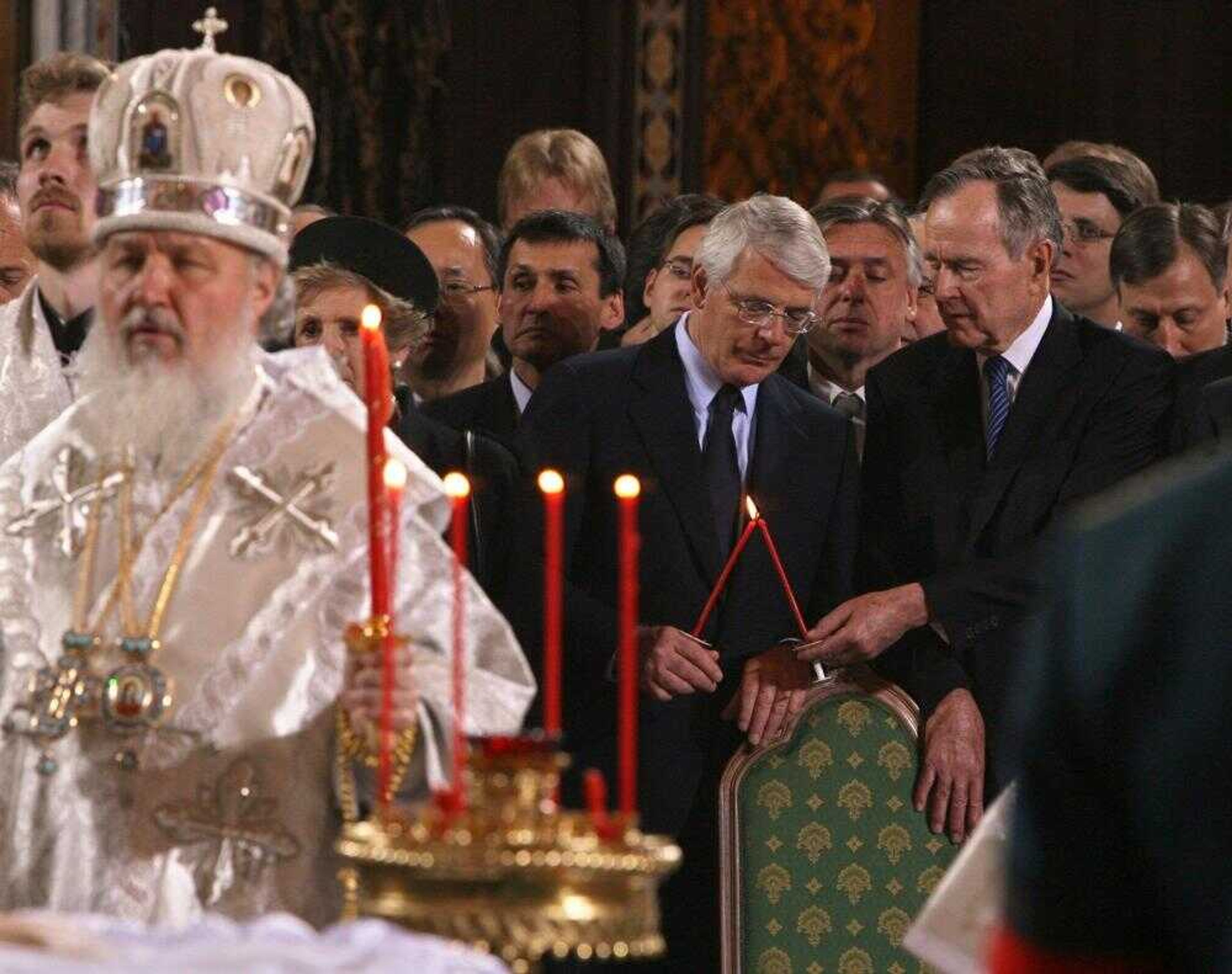Yeltsin laid to rest in elite cemetery
MOSCOW -- Boris Yeltsin was laid to rest Wednesday alongside writers, composers and artists in a funeral that was laden with the religious trappings given to Russia's czars but which also broke with tradition, befitting the first post-Soviet president...
MOSCOW -- Boris Yeltsin was laid to rest Wednesday alongside writers, composers and artists in a funeral that was laden with the religious trappings given to Russia's czars but which also broke with tradition, befitting the first post-Soviet president.
World leaders of his time, including former presidents Bush and Clinton and former British Prime Minister John Major, joined a crowd of dignitaries at the funeral service led by two-dozen white-robed priests in a gilded cathedral near the Kremlin. It was followed by a procession through Moscow's streets to the landmark Novodevichy Cemetery.
"The whole dramatic history of the 20th century was reflected in the fate of Boris Nikolayevich," Russian Orthodox Patriarch Alexy II said in a letter read aloud at the Cathedral of Christ the Savior, using Yeltsin's patronymic. "Being a strong individual, he took upon himself responsibility for the fate of the country at a difficult and dangerous time of radical change."
Yeltsin's anointed successor -- Vladimir Putin -- played a low-key role, attending the church service and marching with his wife, Lyudmila, in the procession. At a Kremlin reception hours after the burial, he promised to pursue his predecessor's goals.
Yeltsin "sincerely tried to do everything to make the lives of millions of Russians better," Putin said. "We will move toward these goals.
"Having become president thanks to the support of millions of citizens of the country, he changed the face of power, tore down the blind wall between society and the state," Putin said.
Before the burial, more than 20,000 people filed through the gold-domed cathedral to view the body of Yeltsin, the first freely elected president of Russia.
Many mourners said they admired Yeltsin for breaking the grip of the monolithic Communist Party and moving the country to pluralism -- and said they feared Putin was reversing the progress.
"I came here to pay respect to Boris Nikolayevich for everything he has given us: freedom and the opportunity to realize ourselves," said 73-year-old Svetlana Zamishlayeva. But now, "there is a certain retreat from freedom of the press, from fair elections, from all kinds of freedom."
Following an 85-minute ceremony that echoed with priests and a choir singing the funeral liturgy, the coffin -- draped in the Russian tricolor -- was driven in a black Mercedes hearse on a winding four-mile procession through the city center and along the Moscow River.
An armored military truck then drew the army-green caisson on the final stretch to Novodevichy, along a lane strewn with red carnations and escorted by a goose-stepping honor guard and the foreign dignitaries and church leaders.
With the coffin resting on a metal cart that resembled a hospital gurney and suggested perhaps some of the ceremony's improvisation, Yeltsin's widow, Naina, stroked his shock of white hair and tenderly kissed his forehead and cheeks. Pallbearers then closed the casket and lowered it into the ground to a booming artillery fusillade and the playing of the Russian national anthem.
The funeral was broadcast live on all major Russian television channels.
Yeltsin, who died of heart failure Monday at age 76, pulled the country out from the Soviet Union and pushed it into a fitful democracy after decades of communist repression and stagnation.
Yeltsin was admired for opposing the 1991 hard-line coup attempt-- scrambling atop a tank to rally democratic opposition -- but derided for his heavy drinking and despised for allowing insiders to snap up Russia's industrial gems while millions of his countrymen were plunged into poverty.
"Fate has decreed that Russian liberators often are not understood -- and are cursed by their people. But I think that history, and mainly time, will put everything in its place," former Deputy Prime Minister Boris Nemtsov told broadcaster NTV.
The last state funeral held in Moscow was for Communist Party chief Konstantin Chernenko in 1985. Yeltsin's funeral was improvised and, in many ways, unprecedented for Russia, where in the past century the country's leaders have been laid to rest in either aboveground church crypts in St. Petersburg or alongside the Kremlin walls or in a mausoleum on Red Square.
The choice of Novodevichy Cemetery was a fitting site for the grave of the country's first post-Soviet, post-czarist leader. An avowed foe of communism who sought to outlaw the party after he came to power, it would not seem appropriate to bury him behind Lenin's tomb, alongside the honored Soviet-era leaders at the Kremlin wall.
Novodevichy holds the graves of an array of Russia's artistic elite, including Dmitry Shostakovich, Sergei Prokofiev and Anton Chekhov. Only one Soviet leader is buried there -- Nikita Khrushchev, who was ousted from power in 1964 and whose grave is about 200 yards from Yeltsin's.
The day's events were mixed with political symbolism -- the burial at Novodevichy, religious services for a nominally pious man in a cathedral restored during his presidency; the playing of the national anthem whose music is the same as the Stalinist Soviet anthem.
As part of his crusade to rid Russia of Soviet trappings, Yeltsin banned the Soviet anthem and replaced it with a 19th-century composition. Putin later restored the Soviet anthem's music as the Russian national hymn.
The emotions Yeltsin inspired were also on display in the lower house of parliament Wednesday, where the communist lawmakers in the State Duma refused to stand for a moment of silence in his memory. Communist deputy Mikhail Zapolev suggested "hammering an aspen stake" into Yeltsin's grave, according to ITAR-Tass.
Connect with the Southeast Missourian Newsroom:
For corrections to this story or other insights for the editor, click here. To submit a letter to the editor, click here. To learn about the Southeast Missourian’s AI Policy, click here.








